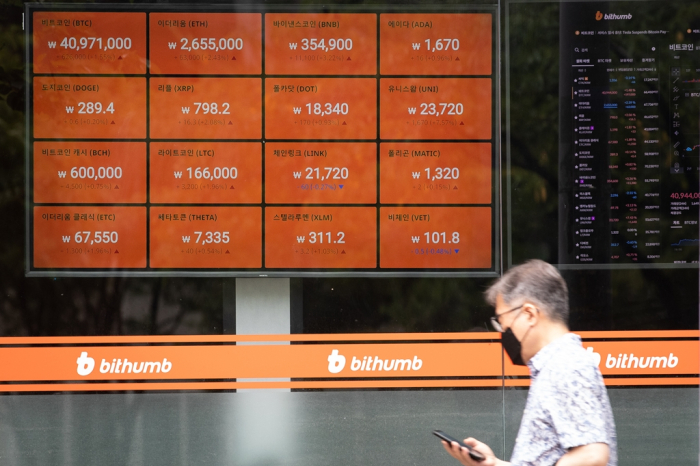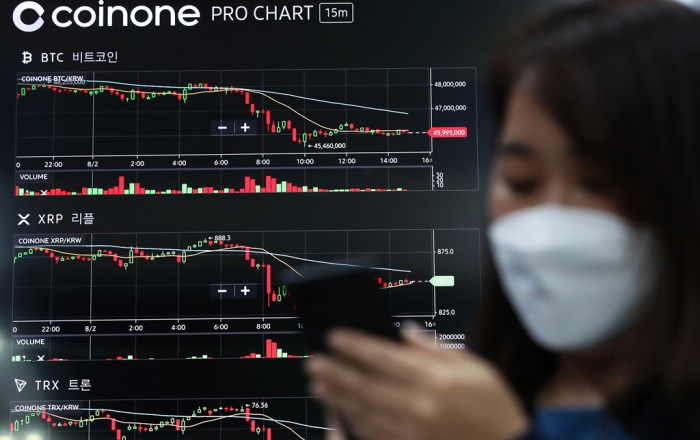Cryptocurrencies
Korean politicians seek to delay crypto taxation as another bubble looms
They want to appeal to millennial and Generation Z voters ahead of the presidential election in March
By Nov 03, 2021 (Gmt+09:00)
3
Min read
Most Read
LG Chem to sell water filter business to Glenwood PE for $692 million


Kyobo Life poised to buy Japan’s SBI Group-owned savings bank


KT&G eyes overseas M&A after rejecting activist fund's offer


StockX in merger talks with Naver’s online reseller Kream


Mirae Asset to be named Korea Post’s core real estate fund operator



South Korean politicians are seeking to delay taxes on gains from cryptocurrency trading by one year as they gear up for the upcoming presidential election amid concerns that another virtual asset bubble is brewing following a crash last summer.
Both ruling and opposition party lawmakers have spoken out against levying income taxes on virtual assets, set to begin in January 2022, citing the need to prepare thoroughly for the implementation of new rules.
Park Wan-joo, chief policymaker of the ruling Democratic Party, said on Tuesday the party will soon talk to the government over ways to push back the levy on crypto gains.
Another ruling party lawmaker Kim Byung-wook also said taxation from 2023 would be more reasonable after clearly establishing the legal definition of cryptocurrency assets.
Opposition lawmakers have also proposed bills on postponing the virtual asset tax, which will be discussed at the National Assembly for legislation before year-end.
Under the current law, the country’s tax authorities are set to impose a 20% tax on capital gains of more than 2.5 million won ($2,116) a year from cryptocurrency trading, starting on Jan. 1 next year.
The government seems to be sticking to the plan, with Finance Minister Hong Nam-ki reiterating that the government sees little reason to postpone it.

APPEAL TO MILLENNIALS, GEN Z VOTERS
Despite the minister’s firm stance on the matter, however, analysts say taxation could be delayed as politicians from both camps are striving to appeal to millennial and Generation Z voters ahead of the presidential election in March.
Investors in their 20s and 30s, whose stake in virtual assets are higher than that of other age groups, have strongly opposed the crypto tax law.
According to government data, the number of crypto investors in their 20s and 30s made up nearly 60% of the total investors in Korea’s four major cryptocurrency exchanges in the first quarter.
Some investors have also complained that the 20% taxation on crypto gains is unfair as the same tax rate will be applied for 50 million won in capital gains from stock investment starting Jan. 1, 2023.
As virtual assets become popular, crypto exchanges have sprung up globally, coming under scrutiny by regulators to ward against the new asset class emerging as a haven for money laundering and financial crimes.
Korea’s financial authorities launched a sweeping crackdown on illegal activities, especially on financially weak smaller crypto exchanges, this summer.
Korean regulators said they are particularly concerned about young people who see virtual assets as a quick path to prosperity amid persistently high unemployment and skyrocketing home prices.

REVIVING CRYPTO FRENZY
Amid tighter regulations, some smaller crypto exchanges closed their operations in Korea, with the value of bitcoin, one of the world’s most favorite virtual assets, falling by more than half in July.
Altcoins -- cryptocurrencies other than bitcoin – have also seen a similar downward trajectory.
However, investor interest in cryptocurrencies was recently rekindled with prices of altcoins surging on their market debuts and then nosediving just a few hours later.
Three altcoins – 1INCH, AAVE and MASK – were listed on Upbit, one of Korea’s four largest crypto exchanges, last week.
1INCH started at 4,165 won and soared 559 times to 23,300 won in just seven minutes before falling to 6,000 won the following day.
1INCH posted a whopping 3 trillion won in transactions on the first day, nearly paralyzing K Bank’s servers linked to Upbit, according to industry officials.
“Compared to other countries, altcoins account for the largest chunk of virtual assets among Korean investors, who want to win a jackpot. It’s really a gamble here,” said a blockchain company official.
Analysts said the Korean government may need to put virtual assets under tighter control to create a safer system for investors.
Write to Hyun-Woo Lim, So-Hyeon Kim and Euni Ko at tardis@hankyung.com
In-Soo Nam edited this article.
More to Read
-
 CryptocurrenciesKorea’s top cryptocurrency exchange operator becomes decacorn
CryptocurrenciesKorea’s top cryptocurrency exchange operator becomes decacornSep 23, 2021 (Gmt+09:00)
1 Min read -
 CryptocurrenciesUpbit dominates S.Korea’s crypto exchange with 80% market share
CryptocurrenciesUpbit dominates S.Korea’s crypto exchange with 80% market shareAug 29, 2021 (Gmt+09:00)
3 Min read -
 Deep Dive: CryptocurrenciesGrowing pains: Korea’s smaller crypto exchanges face shutdown
Deep Dive: CryptocurrenciesGrowing pains: Korea’s smaller crypto exchanges face shutdownAug 05, 2021 (Gmt+09:00)
5 Min read -
 CryptocurrenciesOverseas crypto exchanges end Korean services ahead of rule tightening
CryptocurrenciesOverseas crypto exchanges end Korean services ahead of rule tighteningAug 17, 2021 (Gmt+09:00)
2 Min read -
 EconomyNew FSC chief nominee tough on household debt, against cryptocurrencies
EconomyNew FSC chief nominee tough on household debt, against cryptocurrenciesAug 06, 2021 (Gmt+09:00)
2 Min read
Comment 0
LOG IN


